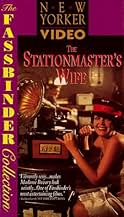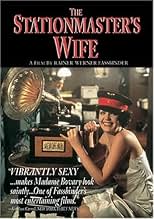Bolwieser - A Mulher do Chefe de Estação
Título original: Bolwieser
- Filme para televisão
- 1977
- 3 h 21 min
AVALIAÇÃO DA IMDb
7,0/10
810
SUA AVALIAÇÃO
Adicionar um enredo no seu idiomaLackluster, plodding stationmaster Bolweiser has the (mis)fortune to be married to the town's siren; his trusting nature leads him into serious trouble when she beds nearly every available g... Ler tudoLackluster, plodding stationmaster Bolweiser has the (mis)fortune to be married to the town's siren; his trusting nature leads him into serious trouble when she beds nearly every available guy.Lackluster, plodding stationmaster Bolweiser has the (mis)fortune to be married to the town's siren; his trusting nature leads him into serious trouble when she beds nearly every available guy.
- Direção
- Roteiristas
- Artistas
Willy Harlander
- Stempflinger
- (as Willi Harlander)
Lilo Pempeit
- Frau Käser
- (as Liselotte Pempeit)
- Direção
- Roteiristas
- Elenco e equipe completos
- Produção, bilheteria e muito mais no IMDbPro
Avaliações em destaque
Televising the work of an avant-garde, openly homosexual director says as much about a West Germany still struggling with its postwar identity in the 1970s as it does about Fassbinder's stature. Railroad stationmaster & petty Nazi Party official Bolwieser (Raab) seems to have it made in his small town between the wars: a secure, respectable job, a position of authority & the most desirable woman in town as his wife. Both he & his wife Hanni (Trissenaar) discover that her beauty & his position are not enough to make a marriage work. After putting up with numerous petty humiliations from her husband--most of them all the more humiliating because they are thoughtless & unintentional rather than calculated & deliberate--she slowly, quietly & deviously explores how far she can go to undermine his power over her. Even as she begins to have affairs with his friends, Bolwieser goes from ignoring his wife's silent rebellion to actually enabling it. In doing so he risks not only his marriage & self-respect but his entire position in society. If you're looking for a noir story of seduction & betrayal like "Double Indemnity" or a sophisticated European battle of the sexes like the contemporary "Swept Away," you will find nothing of the kind. As with all Fassbinder characters, Bolwieser & his wife are individuals highly resistant to gender stereotyping, though they are far from sexless. Bolwieser's love for Hanni is unshakable & while he's aware that he's inadequate, he doesn't know why. Nor do the conventions of his day allow him the means to find out. Hanni never hates Bolwieser or is even very contemptuous of him. Her selfishness is so complete, casual & unassuming that it sometimes has an almost virginal purity which helps explain her husband's powerlessness. Struggling with their own problems & held back by the same societal mores, their friends & neighbors understand little but assume much. Longtime Fassbinder player Raab, who excels at giving somewhat mousy, slightly neurotic characters a very human complexity, is in top form as the unhappy stationmaster. Newcomer Trissenaar, who went on to a successful TV career, is as deft as any Fassbinder actress. Her subtle portrayal of a woman for whom soft but inexorable manipulation is almost instinctive will be quite a change for those accustomed to the over-the-top femdemons created by Linda Fiorentino, Sharon Stone, Lena Olin & Glenn Close. "Bolwieser" is, in a way, much scarier because the viewer, having gotten to know the characters, isn't allowed to escape the suspension of disbelief or take refuge in stereotype or genre. It was another triumph for Fassbinder, who would explore similar themes with his biggest hit,"The Marriage of Maria Braun," before destroying himself. Americans will probably find only the shorter Fassbinder theatrical cut known as "The Stationmaster's Wife," which lacks the intricate subplots of the miniseries but is no less engrossing. It's interesting that the TV version is named for the husband & the movie version for the wife.
Congenial adaptation of the Oskar Maria Graf novel meticulously dissects petty bourgeois society and ideology at a time just before the Nazi takeover of the country; an intense melodrama with excellent cast from Fassbinder's actors troupe.
Certaimly not a tertible film. At times its even interesting. Some of the filns camera work and framing is interesting as well. The biggest difficulty I had with it was its length and its ending, which seemed empty or lacking something. In addition, some of the characterization of the husband was absurd as were some of the plot points. Still, it's worth watching provided you don't expect a riveting experience.
Você sabia?
- Versões alternativasA 112 minute theatrical version in 35mm widescreen, blow up from 16 mm, was authorised by the director.
- ConexõesFeatured in Tod eines Weltstars (1992)
- Trilhas sonoras3rd Movement of the Divertimento No.17 in D-major K.334
by Wolfgang Amadeus Mozart
Principais escolhas
Faça login para avaliar e ver a lista de recomendações personalizadas
Detalhes
- Data de lançamento
- País de origem
- Idioma
- Também conhecido como
- The Stationmaster's Wife
- Locações de filme
- Empresas de produção
- Consulte mais créditos da empresa na IMDbPro
Bilheteria
- Orçamento
- DEM 1.800.000 (estimativa)
- Faturamento bruto nos EUA e Canadá
- US$ 8.144
- Fim de semana de estreia nos EUA e Canadá
- US$ 11.623
- 16 de fev. de 2003
- Faturamento bruto mundial
- US$ 8.158
- Tempo de duração3 horas 21 minutos
- Mixagem de som
- Proporção
- 1.66 : 1
Contribua para esta página
Sugerir uma alteração ou adicionar conteúdo ausente

Principal brecha
By what name was Bolwieser - A Mulher do Chefe de Estação (1977) officially released in India in English?
Responda




























